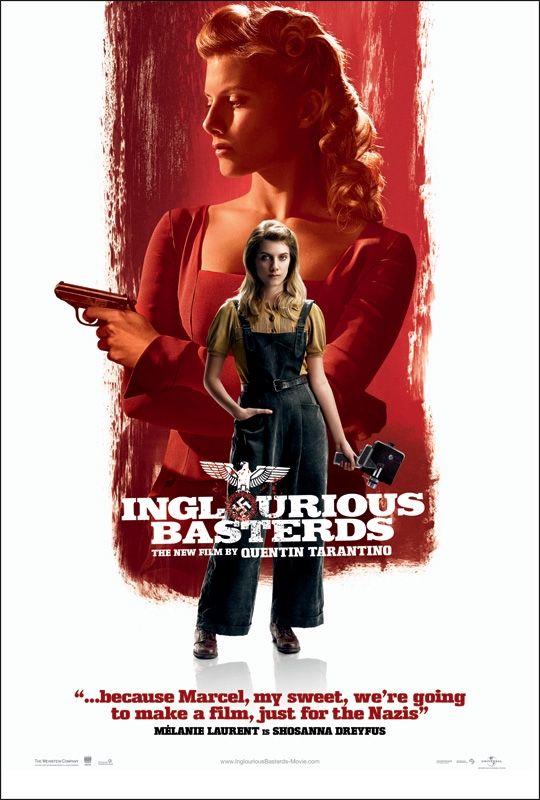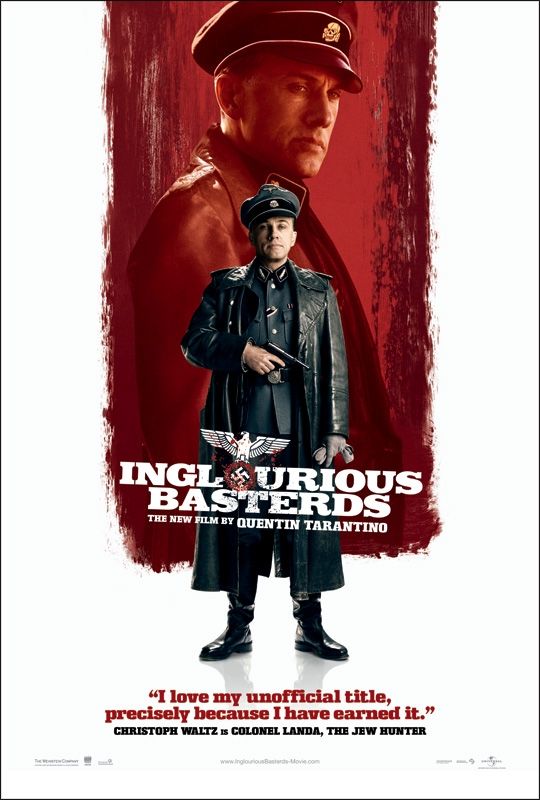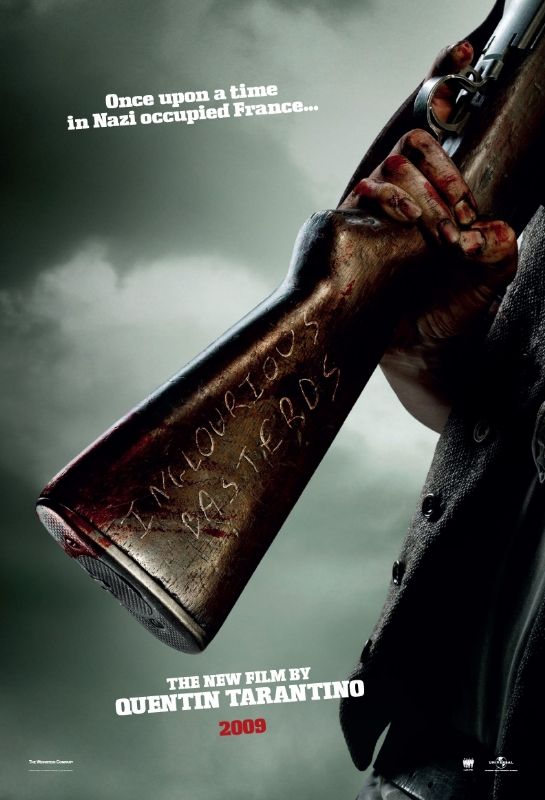You already know if you love or hate the films of Quentin Tarantino. It isn't that his films haven't evolved over the course of his career but they do possess a singular style that is often imitated but never duplicated. His detractors will find his newest film, "Inglourious Basterds" to be his worst while his fans will celebrate it as his best yet. Count me in the latter category. Not only is this film have greater intensity than any horror film in recent memory, it features one of the greatest villains in cinema history. And no, it's not Hitler.
The ads for "Inglourious Basterds" have only sold one story among the three narratives told throughout the film. Featuring Brad Pitt makes sense since he is the biggest draw for the film other than Tarantino. His amusing Tennessee accent and his penchant for being in the "Nazi-killin' business" show the film to be a riff on the World War II genre but followers of Tarantino know better. There are many humorous aspects to Tarantino's movies but never in his professional filmmaking career has Tarantino done a film that fits neatly into one genre. Rather, he's more of a "cinematic DJ", remixing his favorite scenes and moments from other films into a product that's completely his own. His movies may bear the markings of a specific genre like 70s Blaxsploitation or obscure kung-fu flicks, but the result is both a loving homage and a thoughtful examination of the genre's themes and characteristics.
With this in mind, some viewers may be thrown by the distinct tones of the film's three narratives. Each story could work as its own separate film but they work beautifully together as they share and underlying tension and motives of mission that put the character in the moment with only subtle allusions to their backstory.
The story you're already most familiar with is the "Basterds" storyline with Lt. Aldo "The Apache" Raine (Pitt) leading eight Jewish soldiers in a mission to brutally kill as many Nazis as they can find in order to put the fear of Yahweh into the hearts of the German soldiers. When Brat Pitt says that each man under his command owes him 100 Nazi scalps, it's not hyperbole. The Basterds scalp the enemy soldiers. The brutality of the Basterds pushes you as far as you can go to actually feeling pity for the Nazi soldiers. The tension in this storyline never comes from what may happen to the Basterds. It comes from dreading the amount of horrific violence they'll inflict on the Nazis unfortunate enough to cross their path.
And the Basterds storyline is the comic relief.
The second narrative belongs to Shosanna Dreyfuss, a Jew posing as a gentile in Nazi-occupied France. With her blonde hair and aloofness, he manages to go unnoticed as a Jew
by the German soldiers who only notice her beauty. She owns a respectable theatre and her coldness towards the Germans seems to them like understandable French resentment mixed with the defensive yet obvious contempt of a stunning woman who must beat men away with a stick. But to Shosanna's good fortune, she's manages to charm important figures like recent war hero Fredrick Zoller (Daniel Brühl) and even Joseph Goebbels, the Nazi Minister of Propaganda. In attempting to impress Shosanna, Zoller uses his clout to have the premiere of a film based on his heroism (starring the falsely-modest Zoller as himself) shown at Dreyfuss' theatre and attended by the German High Command including Hitler. Shosanna has no hesitation in hatching her scheme to burn everyone in the theatre alive.
What separates Dreyfuss from the Basterds is that she wasn't actively seeking revenge. She obviously wants it but she's smart enough to know that unlike her family and countless other French Jews, she is lucky to still be alive and she won't kill herself pursuing aimless vengeance. But the chance to kill the most important Nazis isn't a choice; it's a call to arms. This revenge belongs to her and to all those persecuted by Hitler's rule. She doesn't try to get a message out to the allies or the resistance. It is her chance in her theatre and her plan. With only the help of her black beau Marcel (Jacky Ido), the tension of Shosanna's story comes from her attempts to execute her plan under the noses of the Nazis she aims to kill.
Finally, there is Hans Landa, The Jew Hunter (Christoph Waltz). Landa is tension personified. He is charming, cunning, brilliant, and ruthless. He is one of the greatest villains in cinematic
history. I could try and describe him as an amalgam of other famous movie villains but that would be a discredit to his character. Tarantino and Waltz have crafted an unforgettable evil who owns the screen even when he's not on it. He is perpetual malevolence; the symbol of the knife on which life rests in wartime, indiscriminate of side even though he gleefully hunts Jews for the Nazis although it's clear that it's not the tenants of National Socialism he admires but the power it provides him.
The first scene in the film functions as a long introduction to Landa and only when it is finally over that you remember to breathe. He has no obvious weaknesses and even if he did, he exists in a world where he has no equal. He is both a coward and a predator and it's difficult to know which came first. Once you see Waltz in action you'll understand why he won Best Actor at this year's Cannes Film Festival and may already be a lock for Best Supporting Actor at this year's Academy Awards. Even if you've already made up your mind about Tarantino, Christoph Waltz will captivate and terrify you from start to end.
Taking a brief break from gushing about the film, I'll mention its few flaws. Like all Tarantino films, there is talking. Lots and lots of talking. His directing skills have increased exponentially with each successive film with "Inglourious Basterds" featuring some of his most stunning cinematography to date. But there's no shortage of dialogue in "Basterds" and while almost all of it manages to maintain the tension, there's a couple scenes that got away from him. Namely, there's an interesting but seemingly-endless scene where an undercover operative attempts to have a discussion with two spies posing as SS officers that manages a great deal of tension but with very little narrative or character payoff. The other scene is a nice bit of exposition between Lt. Archie Hicox (Michael Fassbender), a former film critic turned British spy, and a British general played by Mike Myers (who, thankfully, did not serve as a distraction for me). Again, it's not a bad scene but the only purpose it serves is to reinforce Tarantino's love of cinema.
We're all aware of Tarantino's encyclopedic knowledge of films, both high and low brow, but more than any of his other films, "Inglourious Basterds" is a love-letter to all movies. He masters and remixes references so well that even when you're pretty sure he's making one, you have no idea which movie he's recalling and it makes you want to seek out that movie. I managed to catch Raine's "Hang 'Em High" scar and perhaps a couple others but I love that Tarantino's films aren't simply showing off but are an attempt to expand the horizons of his audience.
Before I conclude, I must mention one aspect that may throw even the most die-hard of Tarantino-fans for a loop. In the scenes with the Basterds, the film sometimes moves so far away from intense, character-driven drama of the other two narratives and gleefully embraces destructive imagery inspired by comic books. In a strange way, "Inglourious Basterds" is a graphic/novel rather than a "graphic novel". What's intriguing is that some parts of the film could come straight from the pages of war-based fiction while others seem ripped out of four-color comic. I wasn't bothered by these schizophrenic leaps because it's not entirely new to Tarantino and I found the film so captivating that I was enraptured by almost every trick he was willing to pull.
Even at 158 minutes, "Inglourious Basterds" is a film I can't wait to see again. It's multi-layered, beautifully shot, uses the classic music of Ennio Morricone brilliantly, and understands its own themes and narrative devices. There's a multitude of fantastic performances from the entire cast along with the delightfully comic Brad Pitt, to the sultry Melanie Laurent, and the unforgettable Christoph Waltz. If you're one of the few who hasn't made up their mind about Tarantino, then "Inglourious Basterds" is a film you can't miss.
Rating ----- A



.jpg)


